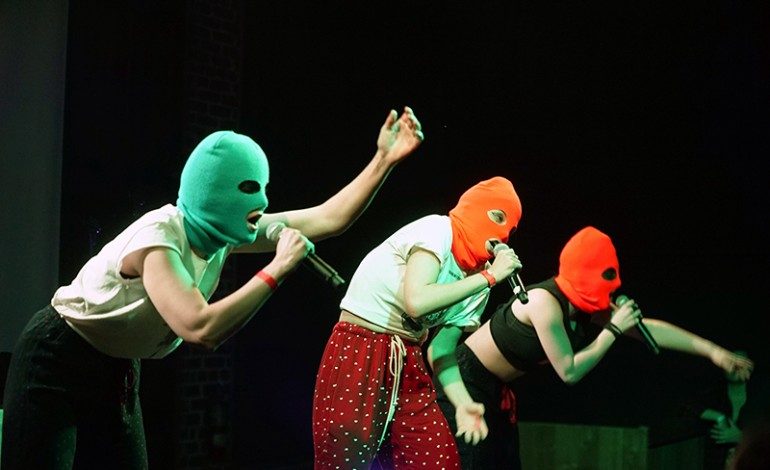

Any time names like Pussy Riot and Sarah Silverman show up together on a bill, it’s hard to expect anything less than a very memorable night of music. The show largely met these expectations, featuring Pussy Riot’s trademark high-production, high-octane main act, a similarly energetic opening act, Rei Ami, and a surprise forty-minute set of new material from Silverman.
The night opened with Rei Ami, from South Korea, who was joined by a lead guitarist on stage left with a cream white guitar and a drummer on stage right. For a three-piece group, the music more than filled the theatre in terms of volume and energy.
Much of the entertainment involved Rei Ami’s interactions with the audience, which were often overt and profanity-laced. For example, the audience was asked between almost every song how they were feeling and to shout back certain phrases, including the singer’s name. Overall, the interaction felt like an attempt to create a larger, stadium-like type of dynamic and much of the audience seemed to buy into it. Many of the songs were a mix of grunge and alternative—again, with great credit to the drummer and guitarist for being able to fill the room with only two musicians.
Rei Ami is a very energetic lead singer, and clearly seeks and thrives off the audience’s energy. This style works well if an audience is seeking more of a show and physical entertainment rather than listening to the substance of the music. In this case, the emphasis was on the delivery of the songs, which may have distracted to some degree from the substance of the songs. Rei Ami moved around the onstage throughout most of the half-hour set, sometimes jumping, sometimes strolling, sometimes sitting, but never standing still. Part of the reason may have been a microphone stand that couldn’t be located, but she nonetheless made a clear choice to try to keep the audience engaged by not allowing them to look away.
The big surprise was clearly Sarah Silverman’s entrance, with a Pussy Riot’s signature balaclava mask on her face, muffling her signature high-pitched voice. The audience roared with applause at her entrance as much as you would expect. She began with what she described as a “jokey joke,” about a Jewish mother and her adult film actress daughter in a “multi-person scene,” in which the former congratulates the latter as being the “best one.” Much of the rest of the set, which was originally speculated by some to be only fifteen minutes but became forty, consisted of Silverman’s trademark raunchy and edgy humor. Among these were jokes that touched on armbands for homosexuals during the Holocaust, a “fresh take” as she called it on the joke category.
There was a relaxation and slowness, a kind of “take it or leave it” that comes with experience in the set. At the same time, time itself seemed to slow down to some degree, as the “quality per second” of the entertainment increased and the audience truly seemed to hang to some degree on every word. At this point, the crowd swelled up in size and the angle of people’s heads all directed at one point.
At the end of Silverman’s set, the crowd began shouting “Pussy Riot” and the big screen projection came down. The drummer walked on first, and the song “Police State” began playing, which was a fitting choice with lyrics focused on politics. “No problems in paradise, we’ll lock them up,” they sing, clearly referencing their native Russia. Although released in 2017, the presence of politically-focused music brings attention back to the broader global conflicts in Ukraine as well as potentially between China and Taiwan, and the unique role that politically-minded musicians can serve.
Clothes were steadily removed throughout the duration of the show, and though “tasteful” isn’t the best fitting word, it didn’t come across as crass or like a cheap stage maneuver. Behind every action and every projected image on the screen behind the stage was the backdrop of politics. Though unclear if the removal of clothing meant anything politically here, and if it did what it meant, there’s still a sense that it probably meant something to the band, related to feminism.
Similarly, many symbols projected in large on the back of the theatre stage didn’t seem to have too sophisticated of a message other than ending the patriarchy, such as the burning of a phallic candle.
One song, “Toxic,” stood out as a heavier song featuring a hard-screaming performance, closer to a metal track than the light electronic studio version. This musical discrepancy is interesting to note given an interview given by Nadezhda Tolokonnikoba of the band to journalist Kevin EG Perry, in which she states that punk music was not an intention originally for the band. Instead, she says to Perry that they primarily embraced punk for its ethos and brand. This description fits the show, as it was one focused on the punk energy more so than the music in the sense that backing tracks did a lot of the musical lifting, leaving emphasis not on the live musical performance and genre but on the stage presence and production.
Overall, the evening’s music was defined more by stage presence and energy as much as anything, and the big standout was Silverman’s ability to tie in a couple more important political and social commentary alongside her trademark raunchy humor.
Photo Credit: Brett Padelford
